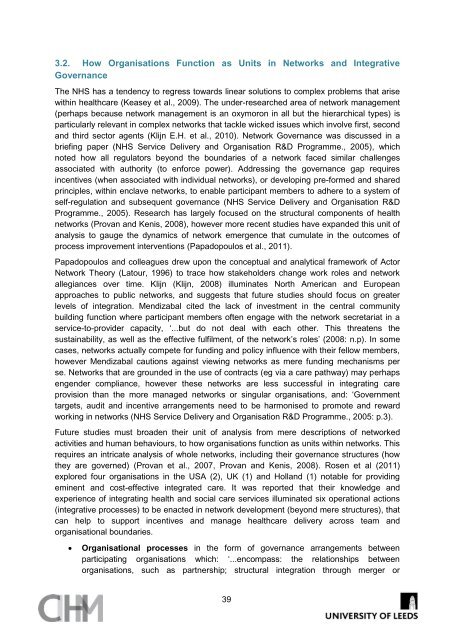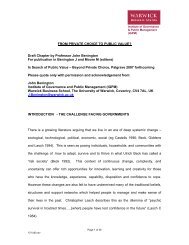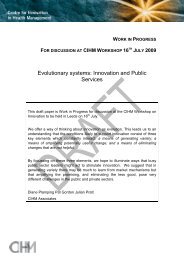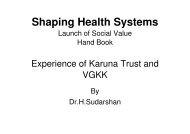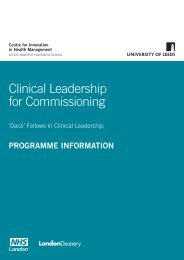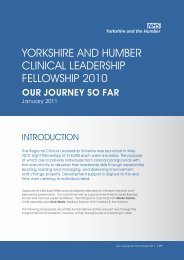3.2. How Organisations Function as Units in <strong>Networks</strong> and IntegrativeGovernanceThe NHS has a tendency to regress towards linear solutions to complex problems that arisewithin healthcare (Keasey et al., 2009). The under-researched area of network management(perhaps because network management is an oxymoron in all but <strong>the</strong> hierarchical types) isparticularly relevant in complex networks that tackle wicked issues which involve first, secondand third sector agents (Klijn E.H. et al., 2010). Network Governance was discussed in a<strong>briefing</strong> <strong>paper</strong> (NHS Service Delivery and Organisation R&D Programme., 2005), whichnoted how all regulators beyond <strong>the</strong> boundaries of a network faced similar challengesassociated with authority (to en<strong>for</strong>ce power). Addressing <strong>the</strong> governance gap requiresincentives (when associated with individual networks), or developing pre-<strong>for</strong>med and sharedprinciples, within enclave networks, to enable participant members to adhere to a system ofself-regulation and subsequent governance (NHS Service Delivery and Organisation R&DProgramme., 2005). Research has largely focused on <strong>the</strong> structural components of healthnetworks (Provan and Kenis, 2008), however more recent studies have expanded this unit ofanalysis to gauge <strong>the</strong> dynamics of network emergence that cumulate in <strong>the</strong> outcomes ofprocess improvement interventions (Papadopoulos et al., 2011).Papadopoulos and colleagues drew upon <strong>the</strong> conceptual and analytical framework of ActorNetwork Theory (Latour, 1996) to trace how stakeholders change work roles and networkallegiances over time. Klijn (Klijn, 2008) illuminates North American and Europeanapproaches to public networks, and suggests that future studies should focus on greaterlevels of integration. Mendizabal cited <strong>the</strong> lack of investment in <strong>the</strong> central communitybuilding function where participant members often engage with <strong>the</strong> network secretariat in aservice-to-provider capacity, ‘...but do not deal with each o<strong>the</strong>r. This threatens <strong>the</strong>sustainability, as well as <strong>the</strong> effective fulfilment, of <strong>the</strong> network’s roles’ (2008: n.p). In somecases, networks actually compete <strong>for</strong> funding and policy influence with <strong>the</strong>ir fellow members,however Mendizabal cautions against viewing networks as mere funding mechanisms perse. <strong>Networks</strong> that are grounded in <strong>the</strong> use of contracts (eg via a care pathway) may perhapsengender compliance, however <strong>the</strong>se networks are less successful in integrating careprovision than <strong>the</strong> more managed networks or singular organisations, and: ‘Governmenttargets, audit and incentive arrangements need to be harmonised to promote and rewardworking in networks (NHS Service Delivery and Organisation R&D Programme., 2005: p.3).Future studies must broaden <strong>the</strong>ir unit of analysis from mere descriptions of networkedactivities and human behaviours, to how organisations function as units within networks. Thisrequires an intricate analysis of whole networks, including <strong>the</strong>ir governance structures (how<strong>the</strong>y are governed) (Provan et al., 2007, Provan and Kenis, 2008). Rosen et al (2011)explored four organisations in <strong>the</strong> USA (2), UK (1) and Holland (1) notable <strong>for</strong> providingeminent and cost-effective integrated care. It was reported that <strong>the</strong>ir knowledge andexperience of integrating health and social care services illuminated six operational actions(integrative processes) to be enacted in network development (beyond mere structures), thatcan help to support incentives and manage healthcare delivery across team andorganisational boundaries.Organisational processes in <strong>the</strong> <strong>for</strong>m of governance arrangements betweenparticipating organisations which: ‘...encompass: <strong>the</strong> relationships betweenorganisations, such as partnership; structural integration through merger or39
contractual relationships; <strong>the</strong> arrangements in place to define and implement goalsand objectives; and <strong>the</strong> assurance frameworks to ensure that agreed objectives areachieved’ (Rosen et al., 2011: p.11).In<strong>for</strong>mational: e.g. shared recordsClinical e.g. care co-ordination Administrative e.g. shared support across practices and training anddevelopment/educationFinancial (risk-sharing budgets, monetary incentives <strong>for</strong> achieving QoS) Normative (role of professional leaders, social networks) (Rosen et al., 2011)The notion of ‘Integrated governance’ reflects both <strong>the</strong> arrangements and agreements asvehicles <strong>for</strong> organisations to a) manage (organise) and control <strong>the</strong>ir respective functions; b) itcan also depict <strong>the</strong> type of governance arrangements that span organisational boundaries(Rosen et al., 2011) 10 . The <strong>for</strong>mer refers to relations between patients and partnershiporganisations (still an under-developed area):A key role of <strong>the</strong> governing body is to support <strong>the</strong> creation of shared goals, valuesand understanding of professional roles across participating organisations, teams andindividuals. With numerous partnership and network arrangements across health andsocial care, many different governance arrangements are already in place. Researchis needed to assess which are most effective <strong>for</strong> driving <strong>the</strong> development of highqualityintegrated services that improve quality, patient experience and efficiency(Ibid. pgs 39-40).3. 3 Network Assessment and EffectivenessChapter 2 drew upon evidence to illuminate <strong>the</strong> breadth and impact of networks which seekto develop better co-ordinated healthcare. Network scrutiny takes many <strong>for</strong>ms (Rhodes,2006), and categories exist on a continuum from <strong>for</strong>mal managed to emergent socialnetworks (Hearn and Mendizabal, 2011), within which research has focused on <strong>the</strong>ir core<strong>for</strong>ms and functions, <strong>the</strong> external context in which networks are constructed, toge<strong>the</strong>r with<strong>the</strong> interests of participant members (Serrat, 2009). We explained how network discourseencompasses social networks, learning networks, delivery networks, organisational networksand beyond, and how different networks have different ground rules and organisingprinciples. Chapter 3 seeks to illuminate <strong>the</strong> factors that make networks effective andsustainable. Fur<strong>the</strong>r evidence about effectiveness and incidence within healthcare willilluminate <strong>the</strong> review. It is now necessary to review <strong>the</strong> effectiveness <strong>for</strong> each categorybe<strong>for</strong>e highlighting <strong>the</strong> leadership task and behaviours per type.Network assessments frameworks can assist in developing a deeper understand of <strong>the</strong>networks effectiveness. Goodwin and colleagues (Goodwin et al., 2006) offered ten lessons<strong>for</strong> successful network management vi . However: <strong>the</strong> complexity of measuring network impactis well documented (Wilson-Grau, 2007), because ‘<strong>Networks</strong> are not magic bullets. They cando what <strong>the</strong>y have been designed to do, but to adopt new functions <strong>the</strong>y need long-term10 See <strong>the</strong> NHS Integrated Governance Handbook, where integrated governance is described as:‘Systems, processes and behaviours through which trusts lead, direct and control <strong>the</strong>ir functions inorder to achieve organisational objectives, safety and quality of service and in which <strong>the</strong>y relate topatients and carers, <strong>the</strong> wider community and partner organisations [...]’ Rosen et al., (2011: p.40).40
- Page 1 and 2: Centre for Innovation in Health Man
- Page 3 and 4: 2.4 Agency Networks, Policy Network
- Page 5 and 6: ‘Networks can take many forms to
- Page 7 and 8: of the parts.based uponintegrity.Ho
- Page 9 and 10: Why theyfailIf it struggles toachie
- Page 11 and 12: Table 2: Examples of NetworksManage
- Page 13 and 14: 1.1.3 The scoping methodologyA brai
- Page 15 and 16: pathways, managed clinical networks
- Page 17 and 18: in terms of a shared vision, common
- Page 19 and 20: Rangachari (Rangachari, 2008) took
- Page 21 and 22: Turrini et al (2009) also raise fou
- Page 23 and 24: Trying things out: just taking some
- Page 25 and 26: Success is attributed/dependant on
- Page 27 and 28: 2.2 Developmental NetworksCharacter
- Page 29 and 30: transaction costs. Also: ‘...the
- Page 31 and 32: The authors acknowledge that the mo
- Page 33 and 34: Research has explored regional clus
- Page 35 and 36: Networks are essentially a form of
- Page 37 and 38: significant social bonds and joint
- Page 39: 3 Network Evaluation and Future of
- Page 43 and 44: to meet the legal and policy based
- Page 45 and 46: Sectors Networks (PSNs) are underst
- Page 47 and 48: coordinated manner, unconstrained b
- Page 49 and 50: Research has shown that there is no
- Page 51 and 52: perhaps are used as a way to avoid
- Page 53 and 54: attempted to determine (section 1.2
- Page 55 and 56: Leadership, 2, 147-163.BOURDIEU, P.
- Page 57 and 58: DOUGHERTY, T. W., CHEUNG, Y. H. & F
- Page 59 and 60: other social media are reshaping he
- Page 61 and 62: NHS SCOTLAND. 2010. Review of nine
- Page 63 and 64: mental patients in a Manhattan SRO
- Page 65 and 66: AppendixPrinciples of engagement (M
- Page 67 and 68: NHS Networks: The document (NHS NET
- Page 69 and 70: iPrinciples of engagement (MENDIZAB
- Page 71 and 72: • frequently updated - not live,


